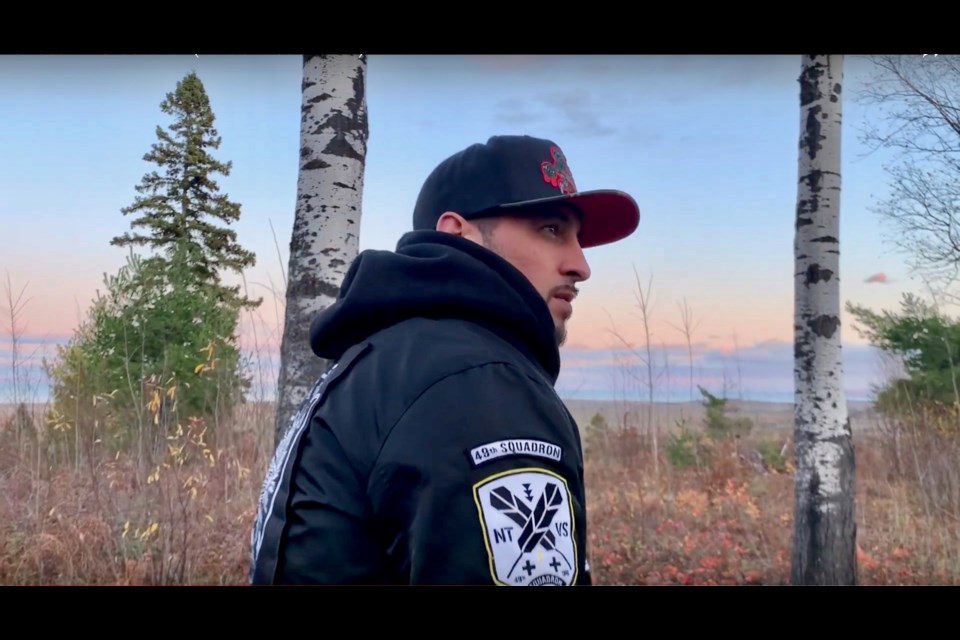Through his art and music, Moosonee's hip hop producer and painter Christopher Sutherland teaches Indigenous youth how to cope with past trauma and issues like anger and depression.
Sutherland, 40, also known as Shibastik, lives in Thunder Bay. He was born and raised in Moosonee where he spent a lot of time fishing, hunting and trapping with his father who was a Cree hunter and taught him different teachings.
He got into hip hop at a young age and says he was one of the few people in the community who listened to rap music.
Sutherland was also into basketball which led him to play for Georgian College's team. He says he was also a three-time captain of Team Ontario at the North American Indigenous Games and he created the “Shibasketball”, a game ball with the four colours of the medicine wheel.
Sutherland began producing music in the late '90s. A few years later, he appeared on national television after his performance with his friend Gitchee Cheechoo at a New Year’s party was seen by Victor Linklater who had a show called First Arts and Music on APTN.
“I was very lucky from the beginning," Sutherland says. “My lyrics have always been about hunting, my upbringing, about the things I learned on the land.”
In addition to producing music, Sutherland is also a painter. He studied fine arts at Georgian College and since the release of his debut album in 2003, he’s been touring across Canada and the U.S. doing motivational speaking and sharing traditional stories, cultural teachings and his artwork.
His fifth album came out in April. Titled Land Bass, it’s been in the works for “quite a while”, he says, but a lot of the songs are relevant now more than ever.
“Most of my music has been fighting for my culture, fighting against corporate greed and white supremacy and all those things that are holding us back. And I’m trying to be careful with my lyrics and not spread racism or hate towards other people," he says.
“A lot of my music does sound angry but that’s how I release it in a healthy way. I use my lyrics that by the end of the song, the anger is dealt with or it’s been released in a healthy way.”
Sutherland also hosts workshops and presentations in Indigenous communities teaching and helping youth understand their history, regain their culture and keep their language alive.
“So, they would stop thinking it’s a Native thing. All those negative stereotypes about us are not because we’re Native, it’s because of what happened to us. And for non-Native people I speak to, (it is) to let them know who we are, let them see a beautiful side of our culture, show them all the things they haven’t been shown.”
For a few years, he worked as an intensive rehabilitation in custody supervision worker and as a bailiff at a secure custody youth detention centre in Thunder Bay taking inmates out on reintegration leaves and medical appointments.
Sutherland was also a part of a cultural committee, run by William W. Creighton Youth Services, helping build a sweat lodge in the detention centre’s yard, organizing programming for young inmates and bringing in Elders to run ceremonies and share teachings.
“That job proved to me that there’s no such thing as bad people, bad kids. Because even though they committed the most horrible things you can imagine when you learn what they went through and their stories and stuff that led up to that, it’s almost like no wonder,” Sutherland says. “No one is born to just do these things, horrible things must have happened.”
He recalls an 18-year-old boy in the jail who had never hugged before and Sutherland gave him the first hug of his life.
“So many parents don’t hug or snuggle with their kids because of residential schools, because of that abuse that happened in the schools. So I try to explain to the kids why it’s like that," he says.
His experience working on music with young offenders prompted him to create a Healing Through Hip Hop workshop. It is a songwriting/production workshop for Indigenous youth who, with Sutherland’s help, have an opportunity to produce beats, write lyrics and compose original tracks. The workshop takes from three to five days.
Sutherland also formed Wetum Boys with Artson, Red Cloud and Antoine Edwards about three years ago after he was invited by Mushkegowuk Council to do a tour across James Bay coastal communities.
He feels passionate about the environment and often raises awareness about diabetes during his presentations. His late grandmother suffered from diabetes and Sutherland himself is diabetic.
“I strongly believe that the answer to our diabetes problem is returning to our traditional way of eating and living.”
Moving forward, he says he is planning to release new music, come up with new ideas for his workshops and make a new collection of paintings.
